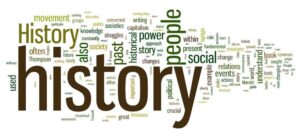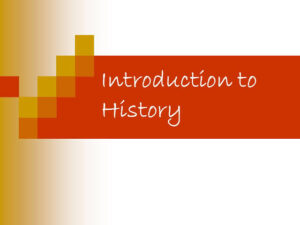Back to: Religion and National Value JSS2
Welcome to class!
In today’s class, we’re going to be talking about Introduction to history. I trust you will enjoy the class!
Introduction to History
What is History?

– History is the study of past events, particularly in human affairs.
– It’s a record of human experiences that covers everything from the monumental achievements of civilizations to the daily lives of individuals.
– History helps us understand change and how the society we live in came to be.
The Importance of Studying History

– Learning from the Past: History provides lessons that help us make informed decisions for the future.
– Understanding Cultures: It fosters an appreciation for different cultures and traditions.
– Developing Critical Thinking: Analyzing historical events develops critical thinking and analytical skills.
– Shaping Identity: History contributes to our sense of identity and belonging.
Key Concepts in History

– Chronology: Understanding the sequence of events and their timing.
– Cause and Effect: Examining the causes of events and their consequences.
– Change and Continuity: Identifying what has changed over time and what has remained the same.
– Evidence and Sources: Learning to evaluate the reliability of historical evidence and sources.
Historical Time Periods
– Prehistory: The time before written records.
– Ancient History: The beginning of recorded human history to the early Middle Ages.
– Medieval History: From the fall of the Roman Empire to the start of the Renaissance.
– Modern History: From the Renaissance to the present day.
Examples of Historical Events
– The Nok Culture: One of Nigeria’s earliest known societies, famous for its terracotta sculptures.
– The Benin Empire: A pre-colonial empire located in what is now southern Nigeria, known for its art and architecture.
– Independence Movements: The struggle for Nigerian independence from British colonial rule in the 20th century.
Methods of Studying History
– Archaeology: The study of material remains to learn about past societies.
– Oral History: The use of interviews and stories to gather personal experiences of historical events.
– Historiography: The study of how history is written and the different perspectives of historians.
We have come to the end of today’s class. I hope you enjoyed the class!
In the next class, we shall be discussing Sources of history.
In case you require further assistance or have any questions, feel free to ask in the comment section below, and trust us to respond as soon as possible. Cheers!
Question Time:
- What is history, and why is it important to study it?
- Why is it important to understand the chronology of historical events?
- Can you give an example of a cause and effect relationship in history?

thanks 👍
Why are you not interested in business?
you are not answering calls why?